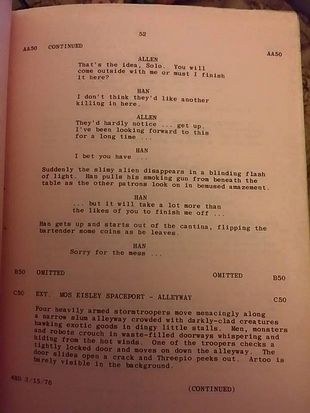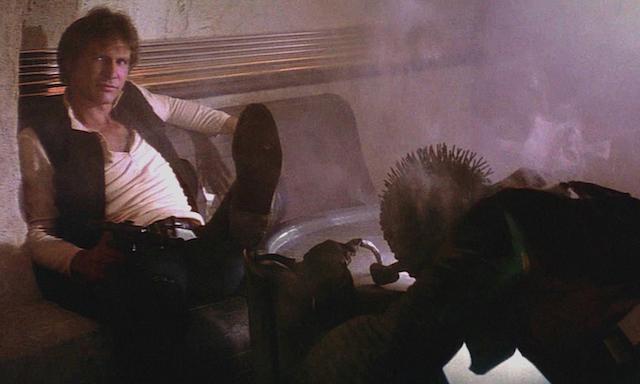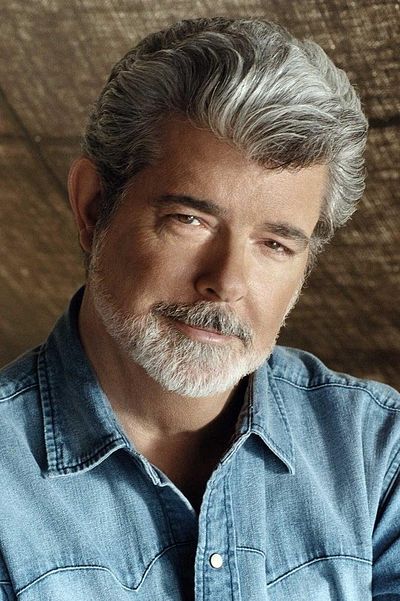In 1988, George Lucas testified before the US Congress to help create what would eventually become the National Film Registry, a collection of films held by the Library of Congress that were deemed to be cultural value.
In a fiery speech, Lucas opened by describing himself not as a chairman of a corporation or as a writer-director, but "as a citizen of what I believe to be a great society that is in need of a moral anchor to help define and protect its intellectual and cultural heritage." Crucially, the director of 'Star Wars' pointed to the prevalence of technology and its ability to change films when in the hands of other copyright owners. Other directors, such as Frank Capra and Martin Scorsese, cited commercial modifications like pan-and-scan as changing the fundamental essence of artistic work.
"People who alter or destroy works of art and our cultural heritage for profit or as an exercise of power are barbarians," Lucas stated. "In the future it will become even easier for old negatives to become lost and be 'replaced' by new altered negatives. This would be a great loss to our society. Our cultural history must not be allowed to be rewritten." It's bold stuff, but the irony of it all is that the original versions of 'Star Wars' are no longer officially available anymore. What's more, George Lucas helped to ensure that when he released the 1997 Special Edition of 'Star Wars' which did almost everything he so fervently argued against not nine years prior.
In Lucas' defence, his intentions for the Special Edition seemed - on the surface, anyway - to be pure. Lucas spent close to $10 million digitally restoring and reworking footage. Of that figure, $3 million went on audio alone. Yet the work was more than just restoration and revitalising. Lucas went a step further and added new scenes, rewrote old scenes, and - in his own words from a 2004 interview with AP - "finish the film the way it was meant to be". The changes ranged from cosmetic to outright revision, but one scene stood out far beyond anything else. In the flow of the movie, it's a relatively minor scene. It serves more to establish a character than it does to advance the story.
Han Solo, after wrapping up a meeting with young Luke Skywalker and Obi-Wan Kenobi, is about to leave the cantina and head back to his ship - the Millennium Falcon - when he's confronted by an opportunistic bounty hunter named Greedo. Han, it seems, has a price on his head and Greedo just so happens to have gotten the drop on him. After a little chit-chat, Han has quietly unholstered his pistol underneath the table they're sitting at and shoots Greedo at point-blank range. The bounty hunter flops forward, dead. He calmly tosses a coin to the bartender and apologises for the mess. End of scene.
Lucas was a great admirer of the works of Sergio Leone and westerns in general, and the scene clearly takes inspiration from them. Take away the special effects, the aliens, the jizz music (yes, that's what it's called), and it could be a scene from 'Once Upon A Time In The West'. You leave the scene with the knowledge that Han Solo is a morally ambiguous character, not above shooting someone first in order to save his skin and one who lives in a violent world where luck changes in an instant. That he does it all so calmly tells you that this isn't the first or last time someone's pointed a gun in his face and threatened to kill him for blood money. Later, when Solo comes to the rescue of the Rebel Alliance and helps to destroy the Death Star with farmboy Luke Skywalker, the shift from cold-blooded killer to redeemed hero is complete.
Yet, in the 1997 Special Edition, the scene takes a different approach towards the end. In a split second, Greedo shoots first and narrowly misses Han, who then returns fire under the table. We even see Harrison Ford jerk slightly to the left instantly after Greedo's shot is fired. Later revisions - such as the 2019 Disney+ edition - of the same scene digitally added even more movement to Harrison Ford and a line of dialogue to Greedo right before he's shot.
Here's the scene from an original 1977 version...
...and from the 1997 Special Edition print.
In a 2012 interview with the Hollywood Reporter, Lucas claimed that it was always his intention to have Greedo shoot first. To Lucas' mind, the original scene was confused and his intention was to make the scene clearer. "It had been done in all close-ups and it was confusing about who did what to whom," Lucas explained. "I put a little wider shot in there that made it clear that Greedo is the one who shot first, but everyone wanted to think that Han shot first, because they wanted to think that he actually just gunned him down."
Yet, in 2015, the late Peter Mayhew - who played Chewbacca in the original trilogy - shared a page from the original script Lucas wrote and gave to the cast. The scene is written patently clear on the page.
Here's that page.

Many directors go back and rework their original vision when time and money allows them to do so.
Oliver Stone released a total of four cuts of 'Alexander', his bloated 2004 epic about the Macedonian warlord. Ridley Scott worked on a total of five different cuts of 'Blade Runner', culminating in the 2007 'Final Cut', which he deemed to be his favourite and the one closest to his artistic vision. Many directors freely admit that some scenes would never be done if they were to make them again. In 'Assault on Precinct 13', director John Carpenter shot a scene where a young girl is shot dead in a drive-by. The movie was slapped with an X rating by the MPAA immediately, yet Carpenter avoided this by simply cutting it out and then pasting it back in after the MPAA gave them a lighter rating. In a 2008 interview, Carpenter admitted that he regretted the scene. "It was pretty horrible at the time - explicit. I don’t think I’d do it again but I was young and stupid," Carpenter said.
Yet, in that 2004 interview with AP, Lucas made it clear that the version everyone saw was not the version he intended - far from it, in fact. "It’s like this is the movie I wanted it to be, and I’m sorry you saw half a completed film and fell in love with it. But I want it to be the way I want it to be. I’m the one who has to take responsibility for it. I’m the one who has to have everybody throw rocks at me all the time, so at least if they’re going to throw rocks at me, they’re going to throw rocks at me for something I love rather than something I think is not very good, or at least something I think is not finished."
This is the crux of the debate, really.
Nobody really knows whether George Lucas, in that smoke-filled soundstage with Harrison Ford glaring at him off to the side, was happy with what he got and moved on. Nobody really knows if, hunched over the flatbed editor, liked what he saw and got everything out of it. Nobody really knows if, years later, Lucas decided he wanted something different from it and did what he did with it. We can only take him at his word. Again and again, he's stated that his intention for the scene was different than the one everyone saw - even if it doesn't make sense, or completely dilutes a character's essence. Any artist will tell you that when you make something and put it into the world, it doesn't really belong to you anymore. It belongs to everyone else. If it's misconstrued, you make something else to counter it or you highlight people's ignorance of your intention and move on.
Ask most people who saw the movie before 1997 and they'll tell you clearly that Han shot first. Even those who saw the movie after 1997 still get this, because the changes by George Lucas have undergone the Streisand effect. Now, everyone knows the original scene better than the edited scene. Altering the scene wasn't the work of someone looking to make a quick profit, but it was an exercise of power. Everyone who saw that scene in its original form took the meaning clearly as Han shooting first and walking calmly away. In 1997, George Lucas decided he wanted to correct this because he had the ability to do so. Does that make him a barbarian, to use his own words against him?
No, because despite his best efforts, everybody knows Han shot first.




















































































